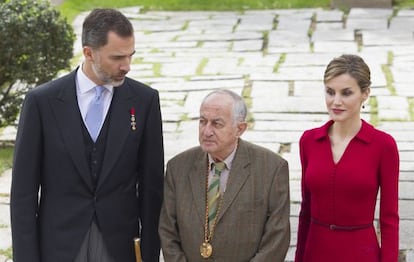Cervantes prizewinner laments state of Spain during ceremony
Juan Goytisolo made unusually short speech after King Felipe VI gave him his award The Spanish writer spoke passionately about social justice and even cited Podemos


Juan Goytisolo, one of Spain’s most important living writers, delivered one of the shortest and most intense acceptance speeches ever seen at the Cervantes Prize ceremony on Thursday.
Speaking in front of King Felipe VI, who personally handed him the lifetime achievement award, the 84-year-old author of Count Julian and Juan the Landless spoke passionately about social justice and Don Quixote, the fictional knight-errant created by Miguel de Cervantes, after whom the literary prize is named.
It is difficult to resign ourselves to the existence of a world laboring under the shadow of unemployment and corruption” Juan Goytisolo
“To return to Cervantes and to assume his madness as a superior form of sanity, therein lies the lesson of Don Quixote,” he said during the ceremony at the university of Alcalá de Henares, Cervantes’ home town.
The Cervantes comes with €125,000 in prize money, and is considered the most prestigious literary award in the Spanish language.
“To Cervantes’ hero, and to the readers like myself whose lives have been touched by the grace of his novel, it is difficult to resign ourselves to the existence of a world laboring under the shadow of unemployment, corruption, precarious living conditions, growing social inequality and the exile of young professionals,” he said, in clear allusion to some of the greatest challenges currently being faced by Spain in the wake of the economic crisis. “If this is madness, then let us accept it.”
Goytisolo, the son of an aristocratic family who joined the Communist Party as a young man and left Spain in 1956 for Paris and Marrakesh, where he currently resides, even made a passing reference to emerging political party Podemos in his speech.
“Let us say loud and clear that yes, we can,” he stated, deliberately using the verb podemos, which means “we can” in Spanish. He also alluded to the Indignados social movement, which lay the foundations for anti-austerity party. “There are multiple reasons to be indignant, and a writer cannot ignore them without betraying himself.”
Goytisolo also made reference to the recent and much-publicized discovery of what appear to be the remains of Cervantes inside a Madrid convent.

“Instead of obsessing with unearthing Cervantes’ poor bones and commercializing them, perhaps with tourism in mind, as holy relics made most likely in China, wouldn’t it be better to shed light on the dark episodes of his life following his arduous rescue from captivity in Algiers?”
A novelist, poet and essayist who has been a regular contributor to EL PAÍS for many years, Goytisolo discussed the business of writing in his speech. After dividing writers into those who “conceive their task as a career” and those who are “incurable apprentices,” he admitted that he was the first type before becoming the second, and that he once sought fame and glory.
“But the true work of art is not in a hurry: it can slumber for decades, like La Regenta [the 19th-century masterpiece by Leopoldo Alas Clarín] or even for centuries, like [16th-century novel] La lozana andaluza,” he said. “The fact that I’m being praised by the literary establishment makes me question myself; being a persona non grata is comforting to me and my work.”
Tu suscripción se está usando en otro dispositivo
¿Quieres añadir otro usuario a tu suscripción?
Si continúas leyendo en este dispositivo, no se podrá leer en el otro.
FlechaTu suscripción se está usando en otro dispositivo y solo puedes acceder a EL PAÍS desde un dispositivo a la vez.
Si quieres compartir tu cuenta, cambia tu suscripción a la modalidad Premium, así podrás añadir otro usuario. Cada uno accederá con su propia cuenta de email, lo que os permitirá personalizar vuestra experiencia en EL PAÍS.
¿Tienes una suscripción de empresa? Accede aquí para contratar más cuentas.
En el caso de no saber quién está usando tu cuenta, te recomendamos cambiar tu contraseña aquí.
Si decides continuar compartiendo tu cuenta, este mensaje se mostrará en tu dispositivo y en el de la otra persona que está usando tu cuenta de forma indefinida, afectando a tu experiencia de lectura. Puedes consultar aquí los términos y condiciones de la suscripción digital.








































